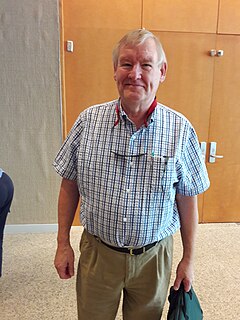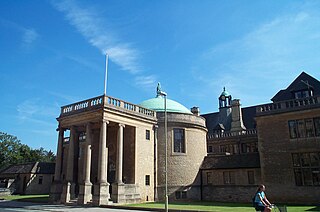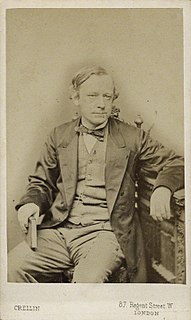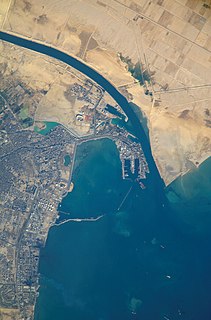
William Holmes McGuffey was a college professor and president who is best known for writing the McGuffey Readers, the first widely used series of elementary school-level textbooks. More than 120 million copies of McGuffey Readers were sold between 1836 and 1960, placing its sales in a category with the Bible and Webster's Dictionary.

The Indiana Territory was created by a congressional act that President John Adams signed into law on May 7, 1800, to form an organized incorporated territory of the United States that existed from July 4, 1800, to December 11, 1816, when the remaining southern portion of the territory was admitted to the Union as the state of Indiana. The territory originally contained approximately 259,824 square miles (672,940 km2) of land, but its size was decreased when it was subdivided to create the Michigan Territory (1805) and the Illinois Territory (1809). The Indiana Territory was the first new territory created from lands of the Northwest Territory, which had been organized under the terms of the Northwest Ordinance of 1787.

Christopher Gist (1706–1759) was a colonial British explorer, surveyor and frontiersman. He was one of the first European explorers of the Ohio Country. He is credited with providing the first detailed description of the Ohio Country to Great Britain's colonists. At the beginning of the French and Indian War (1754), Gist accompanied Colonel George Washington on missions into this wilderness and saved Washington's life on two separate occasions.

William Wright (1829–1898), better known by the pen name Dan DeQuille or Dan De Quille, was an American author, journalist, and humorist. He was best known for his written accounts of the people, events, and silver mining operations on the Comstock Lode at Virginia City, Nevada, including his non-fiction book History of the Big Bonanza.
George Washington Lafayette Bickley was the founder of the Knights of the Golden Circle, a Civil War era secret society used to promote the interests of the Southern United States by preparing the way for annexation of a "golden circle" of territories in Mexico, Central America, and the Caribbean which would be included into the United States as southern or slave states. Bickley was arrested by the United States government and it was during this time he wrote a letter to Abraham Lincoln expressing his distastes with Lincoln's handling of the government.

Vandalia was the name in the late 1700s of a proposed British colony in North America. The colony would have been located south of the Ohio River, primarily in what are now West Virginia and northeastern Kentucky.
This bibliography of George Washington is a selected list of written and published works about George Washington (1732–1799). Google Scholar lists over 6000 scholarly books and articles with his name in the title.
Benjamin Parke was an American lawyer, politician, militia officer, businessman, treaty negotiator in the Indiana Territory who also served as a federal judge in Indiana after it attained statehood in 1816. Parke was the Indiana Territory's attorney general (1804–08); a representative to the territory's first general assembly (1805); its first territorial delegate to the U.S. Congress (1805–08); one of the five Knox County delegates to the Indiana constitutional convention of 1816; and a territorial court judge (1808–16). After Indiana attained statehood, Parke served as the first judge of the U.S. District Court for the District of Indiana (1817–35).

Kate Mason Rowland was an American author, historian, genealogist, biographer, editor and historic preservationist. Rowland is best known for her biography of her great-great-granduncle, George Mason, a Founding Father of the United States. Rowland was also a charter member of the United Daughters of the Confederacy. She later went by the name of "Kate Mason."

Marshall Silas Cornwell was a 19th-century American newspaper publisher and editor, writer, and poet in the U.S. state of West Virginia. Cornwell was a younger brother of railroad and timber executive William B. Cornwell (1864–1926) and West Virginia Governor John Jacob Cornwell (1867–1953).

High Victorian Gothic was an eclectic architectural style and movement during the mid-late 19th century. It is seen by architectural historians as either a sub-style of the broader Gothic Revival style, or a separate style in its own right.

Educating the Disfranchised and Disinherited is a 1999 biography of American General Samuel Chapman Armstrong and his associated normal school for freedmen, Hampton Institute, written by Robert Francis Engs and published by the University of Tennessee Press. The first full biography of its kind, the book portrays Armstrong as a complex politician and administrator in the postbellum period who balanced the needs of opposed parties surrounding the Virginia school: its African American students, Southern white neighbors, and Northern philanthropist funders. Previous works presented Armstrong in a polarized fashion, as either a savior or handicap for freedmen. The book emphasizes Armstrong's upbringing as a missionary in Hawaii in the development of his educational philosophy.
William Beverley (1696–1756) was an 18th-century legislator, civil servant, planter and landowner in the Colony of Virginia. Born in Virginia, Beverley—the son of planter and historian Robert Beverley, Jr. and his wife, Ursula Byrd Beverley (1681–1698)—was the scion of two prominent Virginia families. He was the nephew of Peter Beverley (1668–1728), Speaker of the Virginia House of Burgesses, and the grandson of wealthy Virginia planter William Byrd I (1652–1704) of Westover Plantation. Beverley's mother died shortly before her 17th birthday, and he was sent to England.

A Commentary on the General Prologue to The Canterbury Tales is a 1948 doctoral dissertation by Muriel Bowden that examines historical backgrounds to characters in Geoffrey Chaucer's The Canterbury Tales within the context of its General Prologue.

The Darlington Collection is extensive collection of rare documents, maps, and other historical material focusing on early American history, particularly that of Western Pennsylvania. The original material is housed by the Archives Services Center (ASC) of the library of the University of Pittsburgh with digitized material available at the Darlington Digital Library. The collection was inherited by Darlington's daughters Mary O'Hara Darlington and Edith Darlington. The donation of the collection was first given to the University of Pittsburgh in 1918. The rest of the collection was donated in 1925.
Stephen Foster: America's Troubadour is a 1934 biography by John Tasker Howard that documents the life of American musician Stephen Collins Foster.
The Papers of Thomas Jefferson is a multi-volume scholarly edition devoted to the publication of the public and private papers of Thomas Jefferson, the third President of the United States. The project, established at Princeton University, is the definitive edition of documents written by or to Jefferson. Work on the series began in 1944 and was undertaken solely at Princeton until 1998, when responsibility for editing documents from Jefferson's post-presidential retirement years, 1809 until 1826, shifted to the Thomas Jefferson Foundation at Monticello. This enabled work to progress simultaneously on two different periods of Jefferson's life and thereby doubled the production of volumes without compromising the high standards set for the project.

Jon Kukla is an American historian and author. He attended Carthage College and the University of Toronto, and in 1973 began working with the Library of Virginia, through which he published multiple works and directed historical research. He left the facility in 1990 and two years later began serving as the curator for the Historic New Orleans Collection, of which he later served as its director. Kukla has also served as the director of Red Hill Patrick Henry National Memorial in Charlotte County, Virginia, a position he held until 2007.
Alexander Balmain was an American Episcopal minister and teacher in Winchester, Virginia. He ministered Christ Episcopal Church, as well as serving as rector of Frederick Parish, for four decades, the longest of any rector in the parish. He was married to a cousin of President James Madison, whose marriage to Dolley Payne Todd he would also go on to consecrate.





















